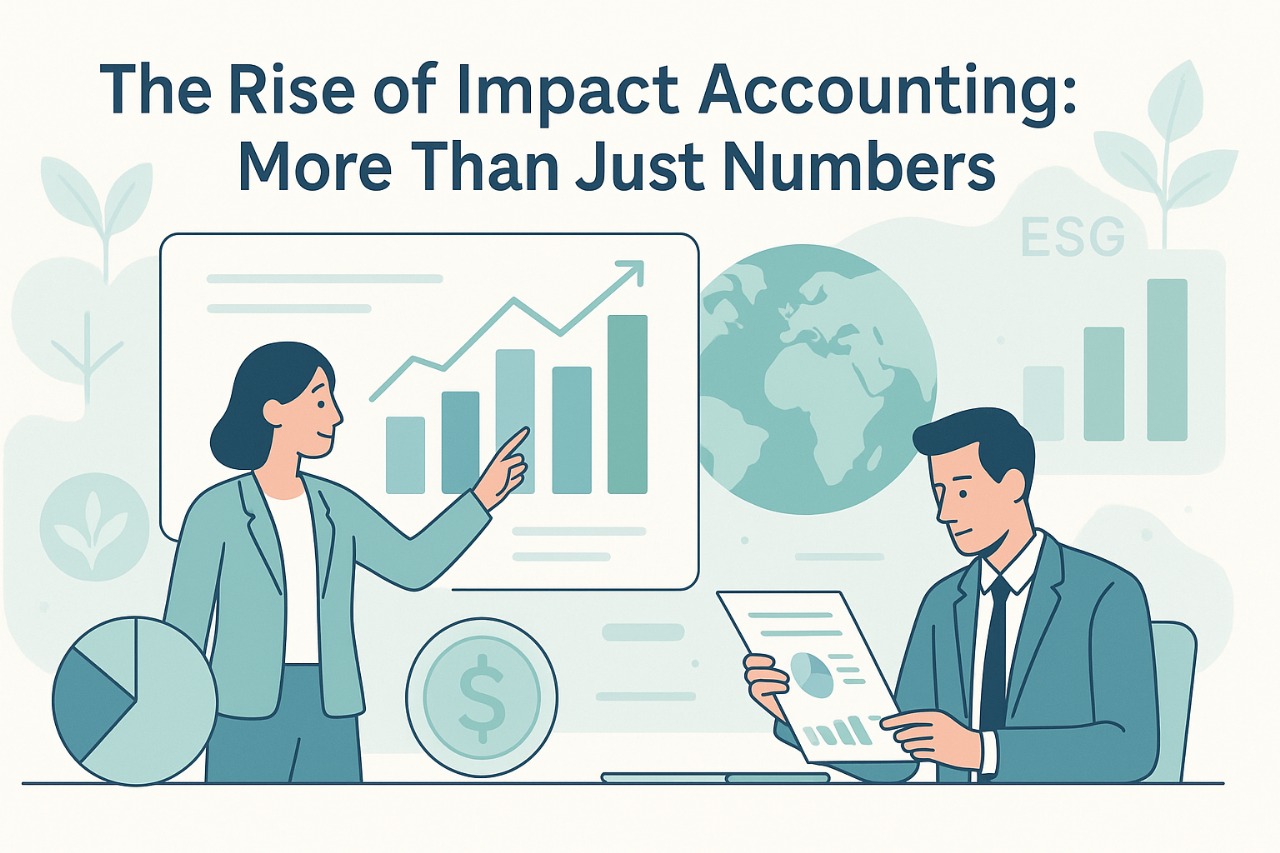
Blog
The Rise of Impact Accounting: More Than Just Numbers

In today’s world, financial reports alone no longer capture the full story of a company’s value. Investors, regulators, and consumers want to know more than just profits they want to know how businesses impact society and the planet. This is where Impact Accounting comes in, transforming the way organizations measure and communicate success.
For professionals exploring the Fundamentals of Sustainability Accounting (FSA), understanding impact accounting is essential. It’s not just an emerging trend; it’s shaping the future of finance and ESG reporting.
What Is Impact Accounting?
Impact accounting goes beyond traditional bookkeeping. Instead of focusing solely on financial transactions, it measures and reports the social and environmental effects of business activities.
Examples include:
- Tracking carbon emissions and energy efficiency.
- Measuring community development initiatives.
- Evaluating diversity, equity, and inclusion (DEI) outcomes.
By integrating non-financial reporting into annual statements, businesses can communicate their true value to stakeholders.
Recommended Reading:
What is Sustainability Accounting? Why It Matters More Than Ever in 2025
Why Impact Accounting Matters for Modern Businesses
Global markets are moving toward transparency and accountability. Companies that adopt impact accounting are not only mitigating risk but also attracting sustainable investors.
1. ESG Reporting and Regulatory Compliance
Environmental, Social, and Governance (ESG reporting) is no longer optional. Standards from IFRS Sustainability and SASB require businesses to disclose their environmental and social impact. Impact accounting simplifies this by linking financial outcomes with ESG metrics, making compliance more seamless.
2. Driving Strategic Decision-Making
When companies measure social and environmental performance alongside profits, they gain actionable insights:
- Which operations carry high carbon costs?
- Which community programs generate measurable value?
- Where can sustainability investments yield better returns?
This integration supports impact investing and accounting, where investors actively seek organizations that deliver financial and societal returns.
Impact Accounting vs. Traditional Accounting
Traditional accounting focuses on profitability and shareholder returns, while impact accounting expands the lens to stakeholders and sustainability.
| Aspect | Traditional Accounting | Impact Accounting |
|---|---|---|
| Primary Focus | Financial performance | Financial + Social + Environmental performance |
| Reporting Standards | GAAP / IFRS | SASB, GRI, IFRS Sustainability |
| Stakeholder Perspective | Shareholders only | Shareholders + Community + Environment |
| Decision-Making Insights | Short-term profits | Long-term value and risk mitigation |
How FSA (Fundamentals of Sustainability Accounting) Supports Impact Accounting
The FSA certification equips finance professionals with the tools to interpret and integrate ESG data into corporate decision-making. Understanding impact accounting is a core competency for anyone aiming to:
- Lead sustainability accounting initiatives.
- Navigate corporate social responsibility (CSR) reporting.
- Support strategic impact investing decisions.
Explore More:
Why Accountants Need FSA Certification in 2025: ESG Reporting Career Scope
Implementing Impact Accounting in Your Organization
- Identify Key Impact Metrics: Decide which social and environmental metrics align with your industry and stakeholders.
- Integrate with Financial Reporting: Combine ESG data with financial statements for holistic insights.
- Leverage Global Standards: Follow IFRS Sustainability, GRI, and SASB guidelines.
- Communicate Value: Use impact reports to attract investors, satisfy regulators, and inspire employees.
Businesses that embrace accounting for social and environmental impact today will be the leaders in tomorrow’s ESG-driven economy.
Final Thoughts
The rise of impact accounting marks a shift from pure profit measurement to holistic value creation. Companies adopting this approach not only future-proof their operations but also drive positive societal change.
For finance professionals, mastering sustainability accounting and FSA concepts is no longer optional; it’s the key to thriving in an ESG-focused world.
Further Learning:
IFRS Sustainability Standards & FSA: A Guide for Indian Accountants
FAQs on Impact Accounting
Q1: What is impact accounting in simple terms?
A: Impact accounting measures how a company’s operations affect people and the planet, alongside financial performance.
Q2: How does impact accounting relate to FSA and ESG reporting?
A: The FSA certification helps professionals understand and apply ESG reporting standards, making impact accounting actionable and strategic.
Q3: Is impact accounting only for large corporations?
A: No. Small and medium businesses can also use non-financial reporting to improve transparency and attract sustainable investors.
